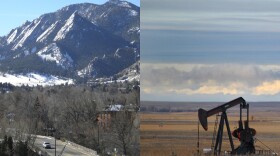What does 2014 hold for Northern Colorado? Strong, stable growth is expected across the region, with a few bright spots coming from places both expected and unexpected.
That's just the economic future many were hoping for as business and civic leaders gathered in Greeley, Colo., for the Northern Colorado Business Report’s 2014 Economic Forecast. Keynote speaker Tucker Hart Adams of Summit Economics said this is an improvement even from six months ago.
“[Then] I would have told you it would have been a year of two steps forward and a step back—very sluggish growth,” Hart Adams said. “I would tell you now I think it will be four steps forward, and a step back.”
Positive prognostications are coming from other economists. A recent University of Colorado Leeds School of Business forecast expects
When it comes to more rural parts of
“We’ve got in excess of $200 per-head profit that the cow-calf and the ranching folks have made over the last couple of years,” he said. “And in 2014, you will see record prices for calves and you will see record profits made in the cow-calf segment.”
That’s driven by lower feed costs and demand outstripping supply.
Energy development in
“It’s expected that the production oil and gas will increase,” said Rutilio Martinez, an associate business professor at the
The boom is trickling down into government coffers and construction projects for production and worker housing. That's good news for the commercial real estate market and people like Michael Ehler with Realtec.
"What I hope to see is a broad-based expansion, not driven just by housing, but driven by other things ..."
“It’s really driven the housing market here in
Ehler said it’s not just
Despite all of the 2014 Summit’s cheerfulness, keynote speaker Hart Adams issued a few caveats. Consumer and business confidence are two factors that could curb growth. It also remains to be seen just how exactly housing will grow. After all, it was a housing bubble that caused much of the Great Recession in 2008. So what needs to be different in 2014?
“What I hope to see is a broad-based expansion, not driven just by housing, but driven by other things which will encourage people to move here, buy houses and it will all work together,” concluded Hart Adams.








